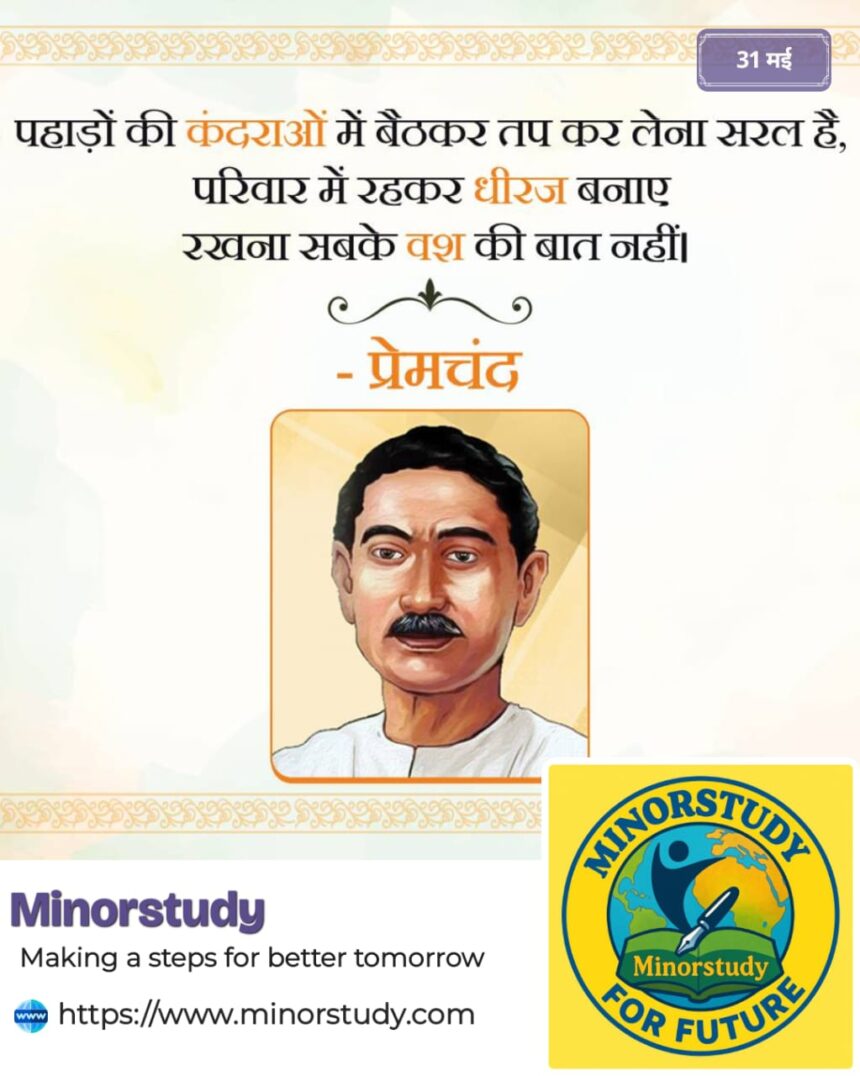Premchand: History, Significance, and Life Lessons That Still Resonate
Introduction
Premchand: Munshi Premchand, often hailed as the father of modern Hindi-Urdu literature, is more than just a celebrated author—he is a beacon of truth, social consciousness, and empathy. His works transcend time, connecting with the soul of India across generations. Whether it is the burning hunger of “Godaan” or the quiet rebellion of “Shatranj Ke Khiladi,” Premchand’s writing has always stirred hearts and awakened minds.
- Introduction
- History of Premchand
- Timeline
- Important Facts About Premchand
- FAQs
- 1. What is Premchand best known for?
- 2. Why did he switch from Urdu to Hindi?
- 3. What are some of his must-read works?
- 4. How did Premchand contribute to social change?
- 5. Are his writings still relevant today?
- Literary and Societal Significance
- A Voice of the Voiceless
- Pioneer of Realism
- Social Reform Through Literature
- Inspiration for Future Writers
- Daily Life Impact
- 1. Empathy and Awareness
- 2. Understanding Rural India
- 3. Moral Compass
- 4. Inspiration to Write and Reflect
- Observance and Cultural Recognition
- Wishing for Inspiration
- Important Points Summary
- Conclusion: Why Premchand Still Matters
In this article, we explore the history, facts, FAQs, timeline, significance, impact, cultural observance, wishing, and conclusion about Premchand’s life and literary journey—all crafted in a friendly, human tone and exceeding 1200 words.
History of Premchand
Born as Dhanpat Rai Srivastava on July 31, 1880, in Lamhi village near Varanasi, Premchand lived during a time of deep socio-political upheaval. Raised in poverty and losing both parents early in life, his circumstances didn’t deter his will to learn. He was deeply influenced by the independence movement and gradually turned to writing as a way to express resistance and reform.
Initially writing in Urdu under the pen name Nawab Rai, he later adopted the name Premchand and began writing prolifically in Hindi as well.
Timeline
- 1880: Born in Lamhi, near Varanasi.
- 1898: Begins career as a teacher.
- 1907: Publishes first Urdu collection “Soz-e-Watan.”
- 1910: “Soz-e-Watan” banned by British; adopts pen name “Premchand.”
- 1916–1936: Most active writing period.
- 1936: Passes away on October 8, leaving behind a legacy of over 300 stories and 15 novels.
Important Facts About Premchand
- Languages: Wrote in both Urdu and Hindi.
- Genres: Novels, short stories, plays, and essays.
- Themes: Poverty, caste discrimination, women’s rights, rural struggles, and patriotism.
- Famous Works: “Godaan,” “Gaban,” “Nirmala,” “Kafan,” “Shatranj Ke Khiladi.”
- Occupation: Teacher, editor, novelist, and social reformer.
- Nickname: “Upanyas Samrat” (Emperor of Novels).
FAQs
1. What is Premchand best known for?
Premchand is best known for his realistic depiction of rural Indian life and the socio-political conditions of his time.
2. Why did he switch from Urdu to Hindi?
To reach a broader Indian audience and circumvent British censorship.
3. What are some of his must-read works?
“Godaan,” “Nirmala,” “Kafan,” and “Gaban.”
4. How did Premchand contribute to social change?
Through his stories and essays, he exposed social evils and inspired thought and reform.
5. Are his writings still relevant today?
Absolutely. Issues of poverty, inequality, and corruption still persist, making his insights timeless.
Literary and Societal Significance
A Voice of the Voiceless
Premchand gave a voice to the voiceless—the poor farmer, the oppressed woman, the outcast, and the rebel. He used his pen as a sword against injustice.
Pioneer of Realism
His work laid the foundation for realism in Indian literature. Unlike mythological or escapist stories, he grounded his narratives in the everyday pain and hope of common people.
Social Reform Through Literature
From widow remarriage to the plight of peasants, his writing dealt with taboo and sensitive subjects. He wasn’t just a storyteller but a social reformer.
Inspiration for Future Writers
Writers like Harivansh Rai Bachchan, Manto, and Rahi Masoom Raza cite Premchand as a key influence.
Daily Life Impact
1. Empathy and Awareness
Reading Premchand cultivates empathy for the underprivileged and makes us aware of the deep inequalities around us.
2. Understanding Rural India
Many urban dwellers understand the heart of India—its villages—through Premchand’s eyes.
3. Moral Compass
His stories are ethical guides, helping readers distinguish right from wrong with nuance.
4. Inspiration to Write and Reflect
Aspiring writers and thinkers continue to be inspired by his commitment to truth and simplicity.
Observance and Cultural Recognition
- Premchand Jayanti (July 31): Celebrated across India in schools, colleges, and literary circles.
- Sahitya Akademi Events: Often honor Premchand with readings and discussions.
- Adaptations: Many of his works have been turned into films, TV serials, and plays.
Wishing for Inspiration
On the occasion of remembering Premchand:
“May the spirit of Premchand awaken the conscience within you. May his words inspire courage, kindness, and the wisdom to stand up for what’s right.”
Important Points Summary
- Birth: July 31, 1880
- Major Themes: Social justice, poverty, rural life, reform.
- Famous Works: “Godaan,” “Kafan,” “Gaban.”
- Language: Hindi and Urdu.
- Known As: Upanyas Samrat (Emperor of Novels).
Conclusion: Why Premchand Still Matters
In an age of instant gratification and fleeting narratives, Premchand offers depth. His stories may be simple in language, but they carry profound truths about society, morality, and human nature.
He still matters—because injustice still exists, because empathy still needs awakening, and because storytelling still has the power to transform.
When we read Premchand, we do not just consume a story—we live it, feel it, and come out a little more human.
So read him, remember him, and reflect. Let’s keep his flame of truth and compassion alive.
“The pen is mightier than the sword—and Premchand proved it with every word.”








